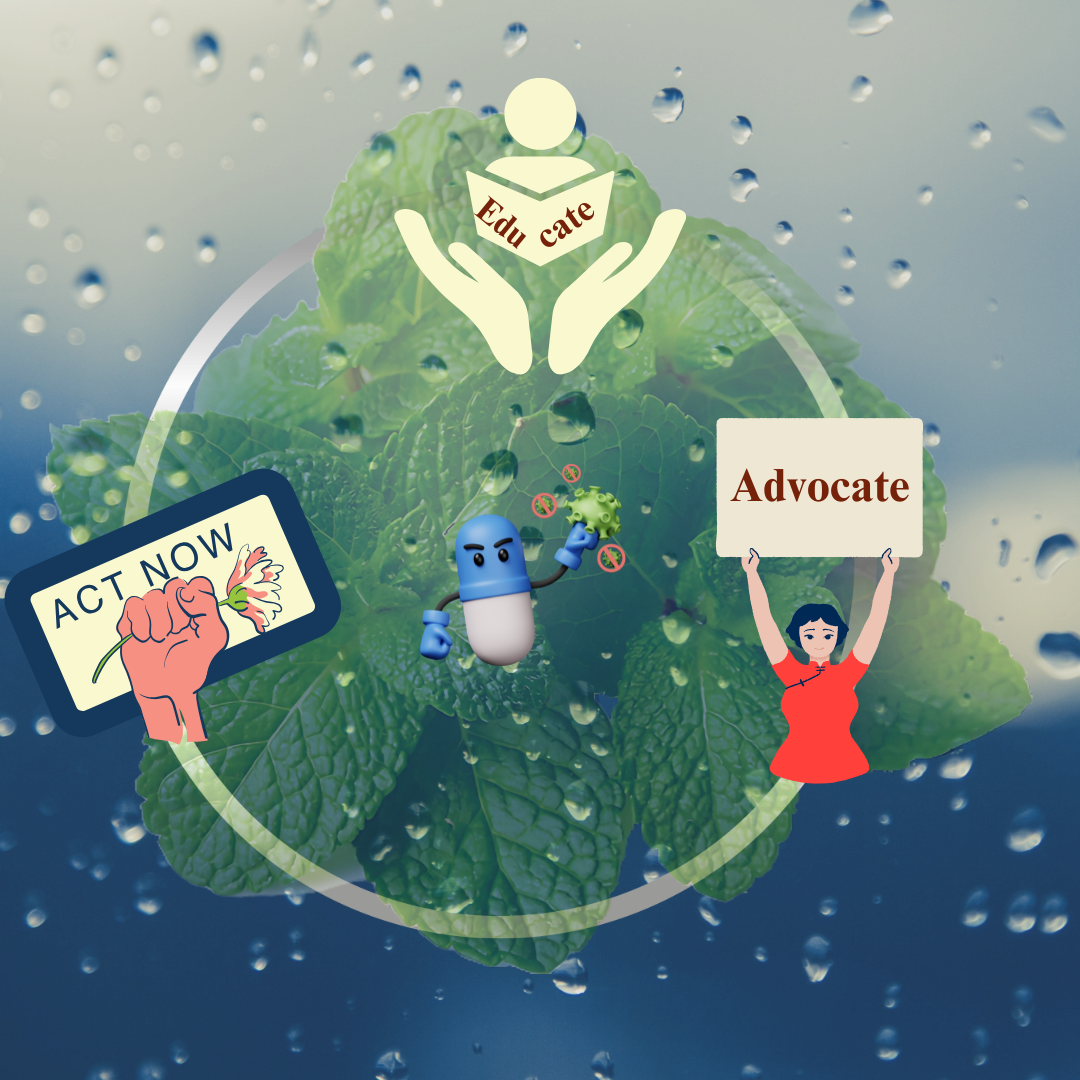Educate, Advocate, Act: A Unified Call to Confront Antimicrobial Resistance
November 20, 2024

The rise of Antimicrobial Resistance (AMR) represents a looming public health crisis with implications for every facet of healthcare and daily life. As microbes develop resistance to the drugs designed to combat them, we risk a future where routine infections become life-threatening and modern medicine’s greatest advancements are undermined.
To counter this, a three-pronged approach—Educate, Advocate, and Act—is not just a strategy but a moral imperative. It’s a call to individuals, communities, policymakers, and global organizations to join hands in preserving the efficacy of antimicrobials for generations to come.
Educate: Knowledge as the First Line of Defense
Education lays the foundation for combating AMR. Without awareness, people may unknowingly contribute to the crisis by misusing or overusing antimicrobials. To create meaningful change, it’s crucial to demystify AMR and make information accessible and relatable to everyone.
1. Understanding the Basics:
AMR occurs when microorganisms such as bacteria, viruses, and fungi evolve to resist the drugs designed to eliminate them. This makes infections harder and, sometimes, impossible to treat. Education should emphasize:
🔸 The distinction between bacterial and viral infections.
🔸 The ineffectiveness of antibiotics against viruses like the flu.
🔸 The importance of completing prescribed treatments to prevent partial resistance development.
2. Empowering Communities:
Outreach programs, accessible language, and creative mediums—like social media campaigns, community workshops, and interactive sessions—are vital. Imagine a farmer learning how improper use of antibiotics in livestock farming contributes to AMR or a parent understanding why antibiotics aren’t always the answer for a child’s fever.
3. Teaching Early:
Incorporating lessons on AMR into school curriculums fosters lifelong awareness. Children become ambassadors of change, influencing their families and peers.
Advocate: Transforming Knowledge Into Influence
Advocacy amplifies the impact of education, turning awareness into societal momentum. It is the bridge between informed individuals and systemic change.
1. Community-Level Advocacy:
Individuals can spark conversations in their homes, workplaces, and neighborhoods. Whether it’s reminding someone to avoid self-medication or encouraging friends to seek professional medical advice, these small actions ripple outward.
2. Policy Advocacy:
On a larger scale, advocacy targets policy changes, such as:
🔸 Regulating over-the-counter antibiotic sales.
🔸 Supporting agricultural reforms that limit non-therapeutic antibiotic use in livestock.
🔸 Increasing funding for research into alternative therapies and diagnostic tools.
3. Collaboration Across Sectors:
Advocacy efforts must unite voices from healthcare, agriculture, education, and governance. Grassroots movements backed by experts and influencers can mobilize public opinion, creating an unstoppable demand for change.
Act: The Power of Immediate Change
While education and advocacy set the stage, action is where impact materializes. AMR demands practical, immediate steps from everyone, whether as individuals, organizations, or governments.
1. For Individuals:
🔸 Practice Responsible Use: Avoid pressuring doctors for antibiotics and only take medications as prescribed.
🔸 Adopt Preventive Measures: Maintain hygiene through handwashing, food safety practices, and vaccinations.
🔸 Support Sustainable Choices: Opt for antibiotic-free foods when possible and advocate for better agricultural practices.
2. For Healthcare Providers:
🔸 Implement antimicrobial stewardship programs to optimize antibiotic use.
🔸 Educate patients on the risks of AMR and their role in preventing it.
🔸 Use diagnostic tools to ensure antibiotics are prescribed only when necessary.
3. For Governments and Organizations:
🔸 Strengthen regulatory frameworks to curb misuse and overuse of antimicrobials.
🔸 Invest in public health education campaigns and research into new drugs.
🔸Collaborate internationally to address AMR as a global challenge.
A Holistic, Unified Approach
The fight against AMR is not a linear journey; it is a cycle where education inspires advocacy, advocacy propels action, and action leads to deeper understanding. Each step reinforces the other, creating a movement that grows stronger with every new participant.
Educate to spread knowledge and empower communities.
Advocate to influence policies and practices for sustainable change.
Act to implement immediate, tangible solutions that protect lives.
Through this triad, we transform AMR from an insurmountable threat into a manageable challenge—one that humanity can overcome with unity, compassion, and determination.
Antimicrobials Are a Shared Responsibility
This is not a fight for scientists or policymakers alone. It is a shared responsibility, requiring the effort and cooperation of every individual. By choosing to educate ourselves, advocate for smarter systems, and act with urgency, we become the heroes of this story—guardians of a future where antimicrobials remain our invisible allies.
Together, let’s safeguard the health of today and secure the promise of tomorrow.
As you navigate the seasons of your own life, remember that growth, wellness, and joy are within reach. The Seasons of Growth 2025 Healthcare Calendar is here to guide you, inspire you, and support your journey. Packed with tools for reflection, cultural insights, and wellness tips, it’s more than a calendar—it’s a companion for a fulfilling year.
Start your journey today. Click here to get yours now on Amazon.
Your insights matter! Be our extra eyes—share your feedback and help us improve.